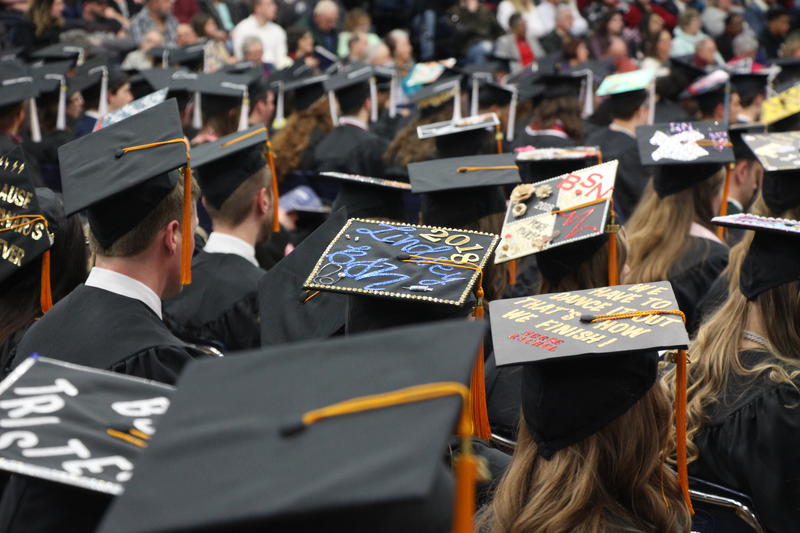
By STEPHAN BISHA
Kansas News Service
For decades, a university education meant students had to load up on math, history and English courses. Now, Kansas universities are slashing those general education requirements so more students can graduate on time and have more room for classes in their major.
This week, Wichita State University became the latest school to reduce how many gen ed classes their undergraduates need to take.
By cutting back on gen ed credits or ditching philosophy and history requirements in favor of specific goals, schools are hoping students can learn skills like ethical reasoning from an engineering course. But liberal arts professors warn the change will take away a core aspect of what a university education provides — a broad knowledge of the world that goes beyond what’s taught in their major.
“Our students will be less competitive, less prepared for the world that they enter when they leave here,” Wichita State University associate sociology professor Chase Billingham said at the faculty vote.
Cutting class
The main driver of Wichita State’s general education cuts is a requirement by the Kansas Board of Regents to reduce credit hours.
In 2017, the board made it their goal to cap most bachelor’s degree program requirements at 120 credits, the minimum needed for a degree. The majority of students fail to earn their degree in four years, forcing them to pay for an extra semester or more of school, so the regents think fewer classes will make it easier for students to graduate on time.
But an across-the-board general education wasn’t the target of the regents’ cap.
Fine arts and engineering faculty at Wichita State complained they already cut as many classes as they could and were still coming in above the credit limit. That’s why they believed general ed cuts should make up the rest.
“We have already cut to the bone our core course,” Wichita State voice professor Pina Mozzani said during the faculty vote. “Our students are going out impoverished in their own area.”
The regents have exempted engineering programs at state universities from requiring more classes, though engineering professors want gen ed cuts so they can put back in more of the major’s core classes.
Faculty pushing for the cuts also argued that Wichita State required 14 gen ed classes, which is more than other competing schools. But some liberal arts professors said their classes shouldn’t be viewed as a burden. Instead, they said, the classes should be celebrated as better preparing students for the post-college world by developing wide-ranging skills.
“I don’t want to get engaged in a race to the bottom,” said John Dreifort, a history professor at Wichita State. “We should still maintain that there are courses in a university that are important for an educated person to have access to.”
Some professors also expressed concern that fewer gen ed requirements would mean fewer students taking their classes. But they also worried that without general education, you end up with state vocational schools.
“This is Wichita State University,” associate history professor George Dehner said. “It’s not Wichita State Tech.”
Ultimately, many liberal arts professors at Wichita State supported the gen ed reduction, swayed by the argument that losing two classes was better than a proposal for four classes.
Professors also went into the vote expecting this to be the last time gen ed was touched for years, though some suggested this was just a patch job and a hard look at reshaping general education was still needed in the years ahead.
“It’s just a Band-Aid on what is a much bigger question about what general education should be in 2019 for our students,” said Aleksander Sternfeld-Dunn, the director of Wichita State’s school of music.
Rethinking requirements
One possibility for WSU’s future is taking a page from Kansas State: ditch the classic university model in which students take specific subjects offered by specialized departments, and instead have them focus on concepts.
In 2012, K-State overhauled its gen ed program (and the University of Kansas made a similar change in 2013). Students in Manhattan still have to take some liberal arts classes. But now a taxation class offered by the accounting department can count toward social science requirements. An animal behavior class from the agriculture department satisfies the empirical and quantitative reasoning goal.
K-State is still evaluating how effective the change has been, but the university said it has seen positive early results.
“It’s not impinging upon any one or two departments to teach all these classes,” said Brian Kovar, a member of the university’s general education council. “It really allows a lot of people to be involved in this.”
Elsewhere, Fort Hays State University is considering allowing some major classes to count toward gen ed, though its main focus is cutting down credits. Pittsburg State University cut gen ed credit this year, while Emporia State University is also looking to do the same.
Stephan Bisaha reports on education and young adult life for the Kansas News Service. You can follow him on Twitter @SteveBisaha or email him at bisaha@kmuw. org. The Kansas News Service is a collaboration of KCUR, Kansas Public Radio, KMUW and High Plains Public Radio focused on the health and well-being of Kansans, their communities and civic life.
